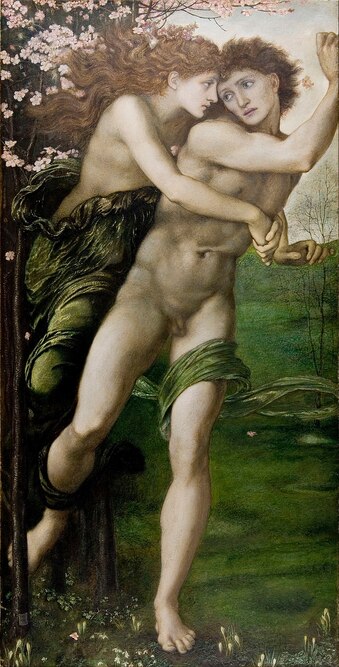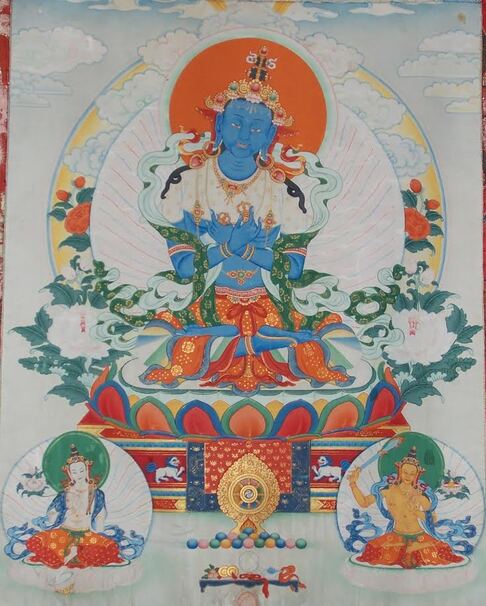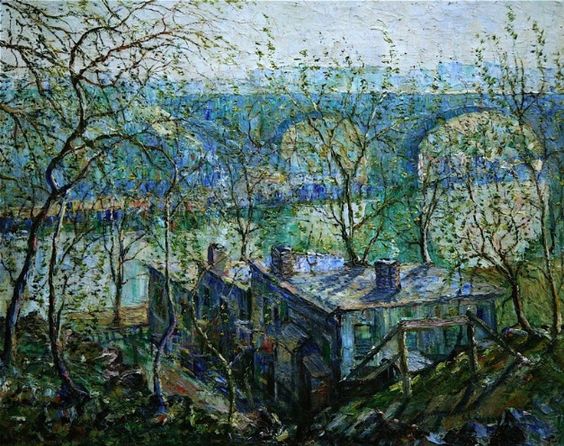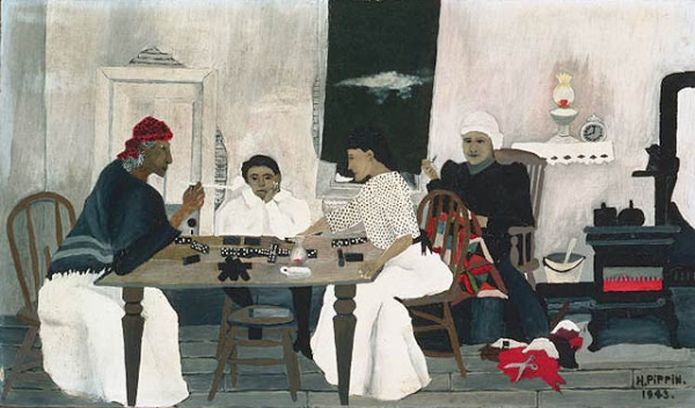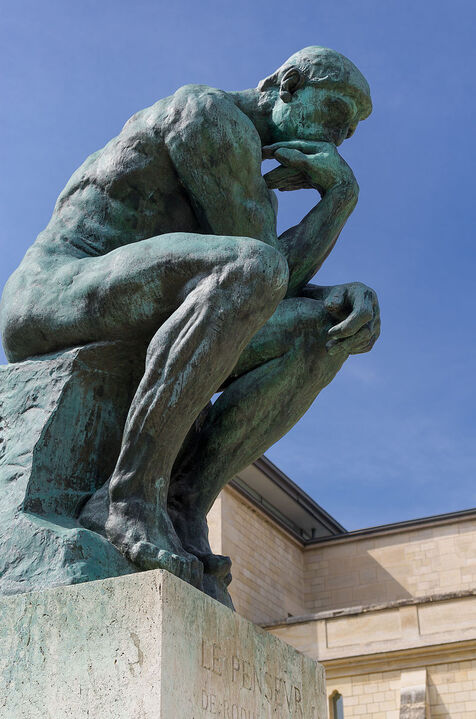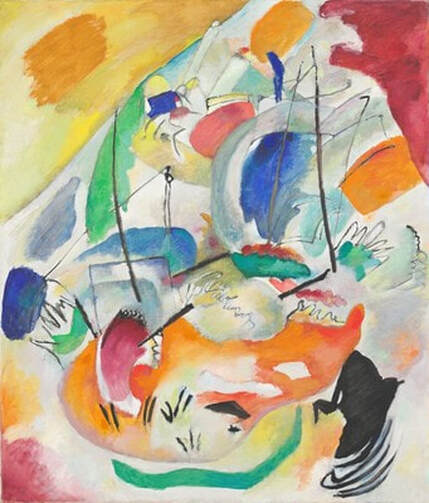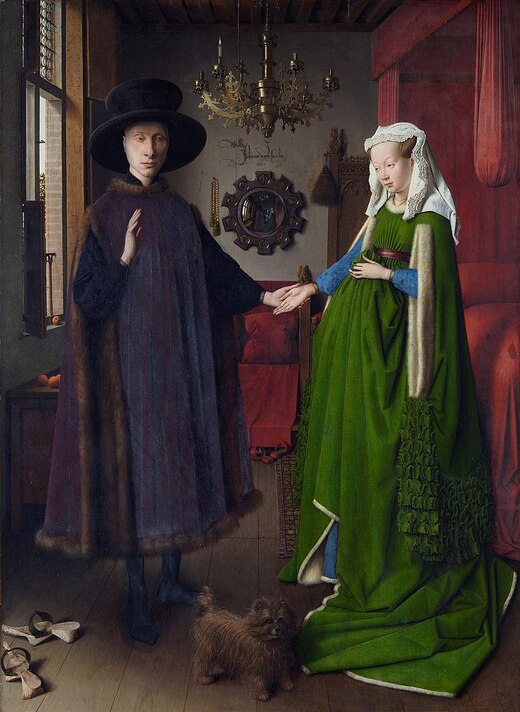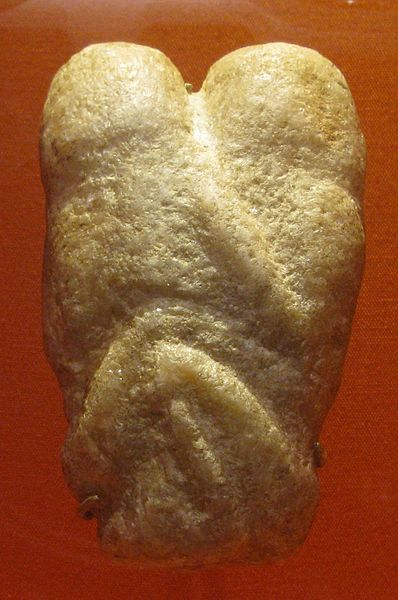|
Georgiana Burne-Jones Rebukes Her Husband Ned you are beguiled by beauty, her talent engulfs you, sucks you in. Maria should not have anything, yet she possesses your soul, your waking moments, procures the passions you’ve long withheld from me. You are part man, part fool. You draw illusion with your brush making her face both Phyllis and Demophoӧn. Phyllis reaches from her blossoming almond to forgive betrayal as no woman could. Withdraw this calumny of art! You might as well cut out your heart, for all can see it here. Ned, Ned, retire to bed, cure this infatuation, leave her! Rich talented Maria will find a better man, there’s the truth, so draw her beauty as the witch, the deceiver: Sponsa di Libano, Circe, Gorgon. Think of the family you have appalled, By acting as Pygmalion, mocked by all. Clint Wastling Clint Wastling’s poetry has been published in Blue Nib, Dream Catcher, Strix, Marble and online with The Algebra of Owls. He’s also been published in the USA in Parody and Avocet. Clint has a pamphlet: Layers published by Maytree Press. His novel, The Geology of Desire, is an LGBTQ thriller set around Whitby in the 1980s and Hull during World War II. He also has a sci-fi novel: Tyrants Rex set 3000 years in the future, both published by Stairwell Books.
0 Comments
Saturn’s Fingerprints Ultimate reality may be more painful than any pain you experience in your life…although you would like to see things changing – not working out as they were, but reshuffling themselves – at the same time, the world remains as it is. – Chogyam Trungpa Slaughter your obsessions With other people’s opinions Vajra at the center alter (And we will get to that) A statue of some past at his knees, each known one carved by some master gone before Each figure a master that sat before them too, draped at their gold shoulders, white & yellow tufted garlands Signifying clouds the storm gathers, passing, the sun flies again into clearing Thought maybe a gender trafficking in rhythm At the base beyond, snow garudas purr & sim- ultaneous protect & indifferently prowl from a sitting position anywhere they are, they are Making white noise, the nerve Fierce & gentle, sensible, abundant The fashion gold plates stand straight up behind the sitter Robes absorb light’s disintegrating chalice dragons gather, enfold flowers in their wings mouths smoldering thunder beneath the hypnotic order & mazed beyond above the maze of day’s confessions, confusion, disillusions, denials, ruts turmeric in lapiz lazuli, lace, Ceylon, silk, saffron Along paths too overgrown with weeds, darker petals, kelp pools loop upright in the storm antler gather, the one who is one the one with the pillow, robes obscure paunch, & ass, the frame with all the blind aches & still he sits, nest pale, translucent skin ovening lungs / the shore, bled, the swerve murmur of roman lambs Orchards bringing song, Martyr in the wheel orchid strumming gasping wakes squall welts along the topaz raft branch & chimera suture bandage of a leaf-eating bandit’s wound Caught along the road the clouds blow away, mountains blow away, huts mown, trees gone down, grass burned, sky billowing, still, away… The pillow settles along rump’s adjusted torque Lungs, the day’s nudge – The summons of myth – That masks the truth of night Darkness takes what it does because we give it length What myth seeks to lift Is made smaller – without malice, a gentle shrine to here & task begins again to unmake it – Restless, skedaddle to the next indivisible jewel crown hovering inflamed Andrew K. Peterson Andrew K. Peterson is a poet and editor based in Boston. He is the author of four poetry books, most recently Good Game (Spuyten Duyvil Press, 2020). His chapbook The Big Game is Every Night (Moria, 2017) was sent to the White House along with other chapbooks from the Locofo Chaps series as a collective protest against the current administration's policies. A previous chapbook bonjour meriwether and the rabid maps (Fact-Simile Press) appeared in an exhibition on poets' maps at the Univ. of Arizona Poetry Center. In 2017 he co-organized the Boston Poetry Marathon. He is a co-founder/editor of summer stock, an online literary journal. First Light Over Highbridge close by Harlem River first light over Highbridge awakens the Metropolis, slowly yawning after another long night as the remnants of winter’s curse hug roofs, cling to gullies to sparkle in sunlight rising from the aura of Queens with smoke escaping to heavens languid, pungent, swirling in morning breeze that oozes through branches where last vestiges of fall remain tarnished ochre and brown clinging tight to marled arms scarred, battered to be consigned to decomposition among mulch squelching in deep crevices of the Bronx as hickory bacon crisps on skillets, coffee percolates too long WNYC meanders loudly above distant aural trauma tractors with trailers, horse drawn carriages to Manhattan yet no boats sailing the Harlem, no carts on slick tracks no workers on sloping sidewalks ice encrusted like the Arctic just solitary feral cats, packs of stray dogs howling in unison chasing tales of headless riders gliding over sleepy hollows in a register well above audible to humans not quite awake as suburbia groans from dystopia at first light over Highbridge close by Harlem River Alun Robert Alun Robert is a prolific creator of lyrical verse. Of late, he has achieved success in poetry competitions and featured in international literary magazines, anthologies and on the web. He particularly enjoys ekphrastic challenges. In 2019, he was a Featured Writer of the Federation of Writers Scotland. Houdini Explodes From the Depths, Laughing At seventeen he was the wild man in a circus who outroared and outran tigers, quitting when a heckler's piece of raw steak hit him in the eye. Later he thought it a snooze to escape from a triple-bolted Siberian transport van--after all, the guards weren't going to leap onto his shoulders, crush his spine with their great claws and bite through his neck. He challenged police to shackle him with best butcher steel. They stripped him nude and searched him intimately for lockpicks, and still he shucked the cuffs like jewelry. Afterward he advertised himself as the only conjurer in the world who performs stark naked! He had a powerful physique and enjoyed showing it off. He burst free from sealed milk cans and bear traps. He was the Jonah man who regurgitated himself from a whale's belly-- chewed through it like a rat, some said. Once (just once) he was well and truly prisoned in iron restraints and his wife, adorable Bess, secretly tongued the key from the rose of her mouth to his, in a deep and swooning kiss. He was never again trapped, never bested. When he escaped from the Chinese Water Torture Cell he saved the audience too. He exploded from the depths laughing, and believers would scream their relief: the wiry dance of his sly fingers, the invincible strength of his ursine shoulders gave them faith in their own blazing escapes. Margaret Benbow Margaret Benbow writes poetry and fiction. Her poems have been published in The Ekphrastic Review, The Georgia Review, Triquarterly, and in many other magazines. Her fiction collection, Boy Into Panther and Other Stories, won the Many Voices Project award and was published in 2018 by New Rivers Press. Knife Angel A mouthpiece, head inclined, hands open in amnesty, my wings rise, a golden halo framing a feathered loss. 100,000 used knives, blunted, crime-washed clean inscribed with lives taken, breath exhumed on blades the coloured handles, a sparkle of sequins dancing on the mundane rage of kitchen drama the trimming, skimming paring of skin from bone words caught in walls like a flutter of despair. I see the alley-gangs, slithers of silver in pockets, anger edgy, serrated even vengeful in killing, I hear the lost souls, dislocated in urban silence screaming for a voice, machete whittling at limbs. I am the messenger, a sorrowful magpie collector of cleaver, scalpel, dagger, your pain and mine welded. Why melt me down or fillet the truth? Read the blades and learn. Kate Young Kate Young lives in Kent with her husband and has been passionate about poetry and literature since childhood. Over the last few years she has returned to writing and has had success with poems published in webzines in Britain and internationally. She is a regular reader of Ekphrastic Review and her work has appeared in response to some of the challenges. Kate is now busy editing her work and setting up her website. Find her on Twitter at @kateyoung12poet. Time Goes Tic tac, end to end, the pieces of the game click clack, and the clock tick tocks. In the pail beneath the guttering the water plip plops in the drip drip of rain, while the logs in the stove crick crack, and the ash sighs and sinks. Where did the time go? you ask, looking in the bucket that overflows drip drip with rain water, and grandma says, Water is life, watch it flow, fire is life, watch it burn, ash is death. Look in the hearth, child, that’s where time goes. Jane Dougherty Jane Dougherty lives and works in southwest France. Her poems and stories have been published in magazines and journals including Ogham Stone, Hedgerow Journal, Visual Verse, ink sweat and tears, Eye to the Telescope, Nightingale & Sparrow, the Drabble, Lucent Dreaming and The Ekphrastic Review. She has a well-stocked blog at https://janedougherty.wordpress.com/ ** Horace Pippin remembers family dominoes 8.00pm, early 1900s Peek back to where your prime gripe fixates on Mama’s tongue, her non-stop clack-pat-tap – everything always black and white, cinched, ribboned – and she wins top spot yet again; back to where Big Mom puffs like a sailor on a broken gib, her thoughts held together by a cotton scarf as she slaps down her DNA and Grandma Pip snips, pins, stitches, patches a legacy of warm colour; back to before you’d held a gun, succumbed to shrapnel or seen bodies raw, war-smacked and yards of bones burnt in stacks – you didn’t know that one day you’d repaper toppling walls, open blinds and depict history for us to keep. Helen Freeman Helen Freeman has been published on several sites such as Ink, Sweat and Tears, Red River Review, Barren Magazine, The Drabble, Sukoon and The Ekphrastic Review. She now lives in Durham, England after many years in the Middle East. ** Make No Mistake We play dominoes on an old card table my husband has carried into the garden. A summer afternoon in Amish Lancaster County, a box of black tiles, three generations together in Pennsylvania’s sedate green hills. Until now, you may think, dear reader, that a family board game with pips and tiles would be harmonious. But no more so than Horace Pippin’s painting of domino players. Let’s not mistake either scene for domestic bliss. My father-in-law’s stroke does not inhibit his wily draw of black tiles, their white pips hidden as he builds a battle wall. He’s foxy, competitive, grumpy. When asked how he is, he always claims “mean and miserable.” His scowl a perfect poker-face not unlike Pippin’s matriarch in her blue shawl and scarlet headdress. Look closely at the sharp, open scissors lying on the blood-red cloth, the flame-red teeth in the coal fire, the red tongues of the oil lamps. Take care when adding a tile to the line as it marches across the table. And when no tiles in your pile fit the strip, beware a trip to the boneyard. Sandi Stromberg Sandi Stromberg’s poem “May in an English Village” will appear in the June issue of Snapdragon: A Journal of Art and Healing. The theme “desire|dread.” Recently, her ekphrastic poetry—written in response to the paintings of Silvia Pinto Souza—was hung with the art in an exhibit at the Jung Center in Houston, Texas. ** The Glass Marble Players Long quiet hours of childhood Sundays loom large and we appear united memories of doing homework, of my mother Magda at her everyday activity the cold stucco whites, greys, and blacks of the barren room brightened by colours of a patchwork quilt and the madder. Primitive folk painting, flat shapes our homeland beyond the mountains war refugees from Budapest grandmother caring for her five grandchildren, cooking, washing, in the after-World War II era mother wearing a cotton midi dress, while she observes the marble players the broken taupe of a concrete floor and oak table slant upward, and the doorway, reed basket spilling over with leftover balls of yarn, the crackling of woodfire, the tongue of red flame in an oil lamp a wick protected by a glass chimney. Steel frame window frames, and the game of shooting marbles, a former military airport, a sub-camp for prisoners of the Nazi Reich a common grave by a round well. Ilona Martonfi Ilona Martonfi is an editor, poet, curator, advocate and activist. Author of four poetry books, the most recent collection is Salt Bride (Inanna, 2019). Forthcoming, The Tempest (Inanna, 2021). Writes in journals, anthologies, and six chapbooks. Her poem “Dachau on a Rainy Day” was nominated for the 2018 Pushcart Prize. Artistic director of Visual Arts Centre Reading Series and Argo Bookshop Reading Series. QWF 2010 Community Award. ** To Horace Pippin Regarding The Domino Players Did you foresee the future there that time would quilt from such despair in many kitchens much the same where meager means became the game of making sure that ends were met as generations bridged their debt to slaves who understood they earned what but by time could be discerned as dream secured by sacrifice that would not shrink from precious price that must be paid in staunch defense of liberty as recompense for change that law cannot control occurring deep within the soul? Portly Bard Portly Bard: Old man. Ekphrastic fan. Prefers to craft with sole intent of verse becoming complement... ...and by such homage being lent... ideally also compliment. ** John Brown's Blood Well, looks like things ain't never gonna change no how, they jist wanna make us think it's so. I was born a slave to a family of slaves and though some say my mind's unhinged I did see John Brown hang, leastways, watched him walk to the gallows. Jist a little bitty girl, five years old is all so Pappy wouldn't let me watch him drop, but I saw him walk to his death tall and straight and defiant, even stopped to kiss a slave baby on the way. I was almost twelve at the end of the war when they said we was free, but what in tarnation is freedom anyhow? Freedom to sit doing patchwork with my old eyes fading fast? Freedom to watch my freed family play dominoes in this drafty, broken down old place which we pay rent for? Slaves don't pay no rent. Free to work every day 'cept Sundays for a pittance they call a wage? Free to run out o' money afore our needs are met? Free to want? Free to starve? Nope, ain't nuthin gonna change. We're still slaves. It's why I use red in my quilts. It's the color of blood - John Brown's blood. The blood of all them soldier boys. And for what? For Freedom? Ain't no such thing as freedom. Stephen Poole Stephen Poole served for 31 years in the Metropolitan Police in London, England. He studied Media Practice at Birkbeck College, part of the University of London, and also underwent training at the London School of Journalism. His articles and interviews have appeared in a variety of British county and national magazines. He has been passionate about poetry since boyhood and his poems have appeared in The Ekphrastic Review, Poetry on the Lake, and The Strand Book Of International Poets 2010. ** The Hour, the Oil, the Shadow of Triumph This is how the trouble begins-- three flames in a small home, the cloud that stands against the night. It is too early for the curse (a dark eye watching from a hem of lace, the fire we mistake for blood), but the luck has gone. The letter slips beneath the table, the numbers no longer align. There is weakness all around: a spindle snapped behind the back, the wall that peels as it stands. Each hint—the bone that sleeps, a scrap of red that becomes a warmth-- appears sharp as a blade. A lament that starts in something so small: a woman with her scissors on the floor, a fist with a needle hidden inside. Lisa Ciccarello Lisa Ciccarello is the author of At Night, a full-length book of poetry out from Black Ocean, as well as several chapbooks. Her poems have appeared in Tin House, The Academy of American Poets, Denver Quarterly, the PEN Poetry Series, Handsome, & The Volta, among others. ** Games Adults Play Alone at the dining table I always sit here. Supper dishes in the Belfast at exactly eight o’ clock. Coffee percolating on the stove, anthracite in the bucket, adults start playing games with me. Mother to my left silent, sullen then far too close Him lounging on Father’s chair, leaning far forward eyeballing Mother, blowing smoke into my face, “So what?” Grandma off her rocker watching but not seeing. Breath chafing my neck, spittle and rum, talking to herself about Mother as a child at my sort of age I guess. Dominoes on the table scattered like hunted rats. Don’t understand rules that adults make up as they play through the game no quarters or dimes; stakes must be higher I suspect. Daydream through the evening wishing things as they were in times before Him, before Father went to war, before arguments, beatings before silly games. Looking up to Mother, she cries. Alun Robert Alun Robert is a prolific creator of lyrical verse. Of late, he has achieved success in poetry competitions and featured in international literary magazines, anthologies and on the web. He particularly enjoys ekphrastic challenges. In 2019, he was a Featured Writer of the Federation of Writers Scotland. ** The Domino Players I really didn’t want to play tonight, Mama and Great Nana always let the time drag longer and longer between moves and frankly, by the time it gets back to me, I’ve lost interest completely. Great Nana always talks about what Mama should do to get a man, as if I were not in the room, I am 14, how much more of a man does she need? I tend the goats, milk the cow, chop the wood, do the chores no one else wants or is able to do. Nana says nothing, she sits in that rocking chair and knits and knits and then expects us to wear the socks, very scratchy, scarves and hats. Mama gets quieter by the day so maybe she does need something. But a man? No, never. I saw Great Nana gazing at the cracked crystal ball that sits on top of the high dresser over there. She tries to pretend it is not so, but...it is. The only answer I come up with is – money, well the lack of it. We are content, mostly. Great Nana says we need a horse, a buggy. Nana sits in the rocking chair and knits. I have not heard her speak since I was seven, a long time, a large burden for Mama. No wonder Great Nana keeps looking at that crystal ball and shuffling cards over and over. If magic can make me into a grown man and coins drop from my fingertips, I will gladly put that cracked crystal ball in the middle of our kitchen table. Jane Lang Jane Lang has had her work published in several on-line and print publications. In 2017, she sent her chap book, Eclectic Edge, to family and friends in lieu of Christmas cards. Jane was nominated by the editor of Quill and Parchment for the 2019 Pushcart Prize, receiving an Honorable Mention. ** Domino Effect Red splashes like blood are fire and light and warmth, just enough brightness to see white dots on worn wood dominoes. I'm that kid at the table stuck between grown-ups who know everything. I'm losing. I'm always losing this game, but this is where the light and warmth is, so I'm kind of stuck. I would join Auntie, take up quilting, but the needle plunging through layers of fabric pricks my fingers, makes me bleed. I make a mess of things. So I play dominoes. I'm the only one who knows I've coloured some of those dots black. Ann Farley Ann Farley, caregiver and poet, is happiest outdoors, preferably at the beach. Her poems have found homes in several literary journals, including, Verseweavers, VoiceCatcher, Gobshite Quarterly, Mom Egg Review, and US 1 Worksheets. She lives in Beaverton, Oregon. ** African American Gothic Sunday dinner dishes long washed and tucked away, oil lamp and coal fire burning, Mother takes her place at table setting out dominoes for a little friendly rivalry. In her peaceful playing state she no longer worries about missing chunks of drywall, or that Grandmother, completely engrossed our game, has abandoned her quilting, leaving dangerously sharp sewing scissors exposed on the floor, or that it’s nine o’clock on a school night and I should be in bed; she appears completely focused, but even while she’s playing Mother intuits my contemplative mood and gently touches my leg assuring me it’s just a game and not to fret about my move, just as our worthy opponent places her final bone on the table and announces Domino. Elaine Sorrentino Elaine Sorrentino is Communications Director at South Shore Conservatory in Hingham, Ma. Her work has been published in Minerva Rising, Willawaw Journal, Glass: A Journal of Poetry, The Ekphrastic Review, The Writers' Magazine, Haiku Universe, Failed Haiku, and has won the monthly poetry challenge at wildamorris.blogspot.com. ** The Homefront Momma and GG set up the tiles, while I sit between them watching--- children should be seen, not heard, they say---besides, we’re waiting to hear Mr. Roosevelt’s Chat. He’s been president nearly my whole life, you know. Great-Aunt Minnie’s in her rocker warmed by the coal stove, stitching on a quilt square. Can’t have too many quilts when Old Man Winter comes. She’s made bundles of hand-knitted socks and scarves for the soldiers, like our Billy. He’s overseas, they tell me, and so, I imagine him sailing over a blue ocean--- while here the world is black, white, and red like a newspaper, each day turns with a snap and rustle, as another domino falls, and we wait for answers to questions we dare not ask. Merril D. Smith Merril D. Smith is a historian and poet. Her poetry and stories have appeared recently in Rhythm & Bones, Vita Brevis, Streetlight Press, Ghost City, Twist in Time, Mojave Heart Review, Wellington Street Review, Blackbough Poetry, and Nightingale and Sparrow. ** On Sunday We Played Dominos It’s like a prayer being together, playing the game the silence of waiting for mama’s move my thoughts centered on a purpose curled within itself I heard that in the Quarter there were pipe-burned wooden dominoes later bois burci, blood included like red flames in the ash of a stove Our dominoes are ebony with white pips My mama and grandma wear dove white Sunday skirts I’m in white too I look for the black bones to connect before I take my turn Amy Phimister Amy Phimister resides in Sturgeon Bay, Wisconsin. She is a member of the Wisconsin Fellowship of Poets and the Belles Lettres writing group. She has been published by WFOP, Yardstick Books and The Ekphrastic Review, and was a finalist for the Hal Prize. ** Shelter Outside there is nothing now but the unforgiving dark Inside our small room where the plaster is cracked and the walls empty we gather at the table three generations intent on our game of dominoes carefully laying every tile trying to build a bridge across the hours while the only light comes from our own small lamps the only heat from the old wood stove and morning’s still so far away Between our circle and the stove grandmother sits working a quilt from bright scraps of cloth stitching comfort all our names and dreams and stories into a fabric that might be wide and strong enough to keep us well through the darkness and the killing freeze waiting for us just outside the door Mary McCarthy In these times it seems like almost everything encourages reflection on the pandemic, a nightmare bad as any we’ve ever had. Mary McCarthy spent most of her working life as a Registered Nurse. Her work has appeared in many journals and anthologies, and she has an electronic chapbook “Things I Was Told Not to Think About,” available as a free download from Praxis Magazine. ** The Domino Players I do not think about wood stoves. I do not think about playing dominoes among old music and old stew, teaching my daughters the strategies that have kept me alive. I do not think about wearing aprons tight around my hips, the loop catching the baby hairs of my neck like a toddler hoping for attention. I do not think about cousins or ancestors or how to make my house feel thick with them. I do not think about the Pennsylvania wind on a night when the valiant windows stave off the snow while the dog shivers in the small brave circle of warmth near the stove. I do not think about the last few logs of wood. I do not think about what I have left to burn. Max Wedding Max Wedding is a public administration student and project manager in Portland, Oregon. ** Playing Dominos on the Homefront, 1943 Happy clatter: click and clack – dominoes in white and black – we hunger for a chance to win at anything (and there’s no sin in that). What’s it matter? Click and clack – White folks win, and we’re still Black. But, even as we share their war, we hold a hope worth living for. Amen. The Old World shattered, we want rights – the freedoms now reserved for whites. For don’t our men miss kids and wives and dare to sacrifice their lives? They do. For now, we chatter. Click and clack, playing games till peace comes back, while Mama quilts more steadfast seams to tuck around the fervent dreams we share. Alarie Tennille Poet's note: "Looking at this painting and its date brought back many personal memories for Alarie. During WWII, her father was a paratrooper in the 82nd Airborne, and her mother was a W.A.V.E. They met just at the end of the war, and both held office in the Virginia chapter of Amvets. Although politically conservative, they often expressed their outrage that the African-American veterans were not allowed to lodge or dine at the hotels where they held their conventions. Serving the country meant you should be honoured by the country in return." Alarie Tennille was born and raised in Portsmouth, Virginia, and graduated from the University of Virginia in the first class admitting women. For Alarie, looking at art is the surest way to inspire a poem, so she’s made The Ekphrastic Review home for four years. She was honoured to receive one of the Fantastic Ekphrastic Awards for 2020. Alarie hopes you’ll check out her poetry books on the Ekphrastic Book Shelf and visit her at alariepoet.com. ** As a Father Shows Compassion to His Children Balanced so well, with its whites and blacks, its reds, the coloured richness of the room’s elements, conceals the poverty endured. Great-grandma smokes a pipe, grandma busies with scissors and thread, mother enjoys the repartee and clack-clack of the tiles and the boy—all four, warmed by the stove’s ample heat, an empty coal bucket standing by and the teapot ready to boil. The stovepipe carries the heat upstairs and on the beds, the quilts are spread. It’s 8 o’clock. Soon all four will ascend the rickety stairs, a pot of potato stew left to simmer for the late-returning worker. He’s done his job; the stew will warm him. He’ll rake the ashes to still the stove, climb the stairs in the dark, and fall into bed. In ‘43 Pippin lets us see moon-illumined clouds on a dark November night. American troops have landed at Salermo, but Germany has begun the counterattacks. Carole Mertz Carole Mertz, poet, reviewer, and essayist, is the author of the chapbook Toward a Peeping Sunrise (with Prolific Books) and the forthcoming collection Colors on the Canvas (with Kelsay Books). She lives with her husband in Parma, Ohio. ** The Colours of My Past, Present, and Future In a black-or-white world, my house had grey walls and grey floors, as if to prove both colours could mix and cohabit. In reality, the greyness resulted from old age, cracks, soot, dust, and poverty. We were poor, but my mom, grandma, and aunt made sure that I knew our value and the value of what we owned. “Find balance in the present, learn from the past, and hope for the future” were grandma’s words of advice, passed on from her daughters to her grandson. I learned by example. On Sunday evenings, we played dominoes for hours on the kitchen table: the black tiles with white pips inverted the pattern of mom’s black polka-dot blouse, her and grandma’s white skirts tuned up to my aunt’s black poncho top and white head scarf, my white shirt combined with black pants and shoes, a white doily was crossed with black diamond shapes on our only shelf, and a white bucket sat next to a black coal-burning stove. Another colour, the red of the blood shed by my people, enslaved and exploited like grandma, lay on the floor on a red scrap of cloth that my aunt used for quilting, while grandma, letting white smoke waft out from her white pipe, wore the red on her head scarf as a badge of honor. The also-red warmth from the coal fire and the flames from the oil lamps would always light my way as a black person living in a white world. Out of the window, a grey cloud floated freely in the dark sky of Goshen, New York. Mari-Carmen Marin Mari-Carmen Marin was born in Málaga, Spain, but moved to Houston, TX, in 2003, where she has found her second home. She is a professor of English at Lone Star College—Tomball, and enjoys dancing, drawing, reading, and writing poetry in her spare time. Writing poetry is her comfy chair in front of a fireplace on a stormy winter day. Her work has appeared in several places, including, Wordriver Literary Review, Scarlet Leaf Review, Dash Literary Journal, Months to Years, The Awakening Review, Lucky Jefferson, San Fedele Press, Willowdown Books, The Comstock Review, The Green Light Literary Journal, and Mothers Always Write. ** Commonplace Naïve to think that commonplace should not be moved beyond the book; for any light from upper left must seep to favoured record frame. A column advert set art pace, first paint box won, with crayons, son who won the contest, boyhood fun, an entry point to pastel scheme. He carried what his eyes had seen, and stacked his memory with sense, to shape own world for ignorant, used porter, packer, moulder skill. A front line troupe, back row at home, for land of free, no Goshen braves, Harlem Hellfighter in the trench, from colour-blind, the Croix de Guerre. Two decades on, when mood had moved, less colour chart, a Purple Heart, mark courage, yellow opposite, though cordial, vein pump, cord red. The polka blouse, spots pallid space, where plaster scarred by wattle daub, with oil lamp, Sunday, nine at night, toque, cloth, quilt, fire, for crimson signs. Contemplative, lad, matriarchs, what slant, which plane is in his mind, ferocious scissors, teething flames, these dangers through the pupil child? By tiles of floor, pile, wall of nips like fire, three generations joined, these Methodists, pray, quilt, smoke pipe, through dobs of oil, those dominoes. The apple of his mother’s eye, as any Pippin son must be, the most important of his race, as eulogised in NYT. This commonplace is rarefied, unknown white north of Dixon line, insight Horace, massed dominant, but do they read, appreciate? Stephen Kingsnorth Stephen Kingsnorth (Cambridge M.A., English & Religious Studies), retired to Wales from ministry in the Methodist Church, has had pieces accepted by some thirty online poetry sites, including The Ekphrastic Review; and Gold Dust, The Seventh Quarry, The Dawntreader, Foxtrot Uniform, The Writer’s Café, A New Ulster Poetry Magazines, Vita Brevis Anthology ‘Pain & Renewal’ & Fly on the Wall Press ‘Identity’. https://poetrykingsnorth.wordpress.com/ ** Secret Numbers "Pictures just come to my mind and I let my heart go ahead." Horace Pippin "I let the words go the way they want to go..." Stanley Kunitz "...the old grandmother/sits in the kitchen with the child beside the Little Marvel Stove..." Elizabeth Bishop, Sestina The gypsy woman in the broken chair always comes in wintertime; she always wears a red bandana and a striped wool shawl to warm her while she tells the boy what his future looks like in cards and dominoes; in crystals of snow falling on mountains she crossed to come before Christmas... Outside the night window the world grows old created with its sad, scarred history of inequality and war -- but the boy doesn't know that yet with dominoes laid out on the kitchen table like a map the gypsy decodes with the wonders of nature, how it changes, rich and poor with the magic of seasons, mother nature like his mother's hand picking up a domino. The tea kettle whispers on the wood-burning stove, coming to life in the picture to make tea leaves for the gypsy to read -- a luxury -- like the mince mixed with port stored in jars, top-shelf with a "p" in the cold cupboard: cooking apples -- pippins -- raisins, sugar, spices combined months ago to save for special moments in the artist's interior landscape a painting where fabric squares made from worn-out clothes are sewn into his grandmother's quilt like diary entries, pictures of his childhood -- a game of dominoes -- before the art of family life was interrupted by ominous predictions (numbers and names encrypted in war codes); years fought for America's freedom -- patriotism in spite of segregation (WWI, The Barracks) -- then coming home to begin painting what he heard his heart say (Holy Mountain, I and II) canvasses with an afterlife where animals gathered at Christmas time and souls replayed the games of life in black and white and green when dominoes were plucked like leaves from an extramundane tree. ii and see how the boy's winning when he paints the stove its belly filled with wood and fire -- enough wood chopped a marvel and a wonder! paint to warm the winter! So falls the snow like white spots on the dominoes, the years of abstinence and plenty night replayed on the windows as the gypsy reads the domino numbers: (28, 2 + 8 = 10) a hard winter, fire and ice -- white shirts and skirts the 7 deadly sins washed white as snow mother dressed like a domino (white blouse, black dots) white stars in omnivorous nights when there's no food on the table; when the gypsy comes and the only sin is Hunger so she tells the story of the bear who came to the window and ate the pie while the family played dominoes (she calls them magic dominoes); and the family counts how my years they saved up for the niminy-piminy bottle of port to spice the pie and bless the boy with a future in pens and paint brushes -- apples, pippins, mince -- snow dots and domino spots -- a folk art game of dominoes (28, 2 + 8) secret numbers (1 + 0) -- Horace Pippin's intuitive art, dominoes flavored with infinity Laurie Newendorp Laurie Newendorp lives and writes in Houston. Her recent book, When Dreams Were Poems, 2020, explores art, including ekphrastic poetry. One of her ekphrastics, "Orpheus In The 21st Century," was listed with The Ekphrastic Review's "Fantastic Ekphrastics." Her definition of the mind-body link in writing poetry, "Think With Your Heart," describes the way art (Art Naif) finds ingenuous creativity in pictures of child- hood, as in Horace Pippin's The Domino Players, 1943. Le Penseur The thinker tenses, skin stretched with muscles’ tautness. Hanging ape-hands betray the physical, animal quality of his thought. The thinker has a problem, skin in the game. The thinker’s grimace conveys not concentration but travail. A twisted posture expresses not repose but painful strain. The thinker contemplates because he cannot kick his problem to submission. He may resort to force; meanwhile, he imagines a stratagem. The thinker’s massive body bends as thinking weighs him down. He bears his thoughts like rocks from a quarry or water from a well. Greg Sevik Greg Sevik is an Assistant Professor of English at Cayuga Community College in Auburn, New York. His scholarly essays have appeared in such venues as The Hopkins Quarterly and The Emily Dickinson Journal. His poetry was published recently in Cholla Needles. Sea Battle There was a moment after the sinking of the boat when there was silence as we reached the bottom of the sea there was a moment when the storm gave us back the sky and the clouds sent down gifts, cerulean, blue-green, ice-blue, crimson, purple, gold, indigo, and men became like singing seals claiming the ocean for themselves we sang in that moment and the sound held fast against the light tiered with the water's turquoise men floated up like single flowers while synaesthetic angels plucked music, orange, lemon, tastes at the edge of honey when the storm came again I was alone with the self in the dark ocean of my soul wretched, but rising still Thelma Laycock Thelma Laycock has been published in various magazines and anthologies. Her two poetry collections published are A Persistence of Colour (2011) and A Difference in Direction (2015) (both Indigo Dreams Publishing), plus, a series of interlinked short stories, Connecting North, (Stairwell Books, 2019). Some of her work has been translated into Hebrew, Romanian, Italian, French, and Welsh. Johannes de Eyck Fuit Hic 1434 On the sacred floor of the marriage bedroom Arnolfini stands clasped hands beside his wife, one lighted candle, one snuffed, a husband memorializing his departed, the vital flame wedded to the wick of the dead, the holy ghostly present. So is van Eyck the eye drawn into the mirror entrapped I can see every quick stroke of his brush deftly stopping by pieces, in planes the movement of the wall the flame the wife’s trembling upturned palm, Arnolfini’s left eye the brush moves the eyes move, Arnolfini’s right eye the dog and then the mirror slowly free- zes van Eyck his arm his hand. How did the light commune with itself, when the brush stopped the mirror moved? We are there between the unbound couple and van Eyck, witness to loss, must turn round to see the painter turn back to see the mirror ourselves we moved we stopped. Sollace Mitchell Sollace Mitchell is a writer and filmmaker who has published occasionally, in The Nantucket Review, The American Oxonian, and others. He lives in Paris with his wife and two young daughters, all of whom are smarter and more charming than he is. Ain Sakhri Lovers “considered to be 11,000 years old and to be the oldest known representation of two people engaged in sexual intercourse” Wikipedia Legs locked like arms in embrace. Each head seen from the side a mushroom shape like your secret self squeezed in your grip about to contract and release its own gravity. Hands on a pinchpot fingers coaxing a drinking vessel a soup bowl a shallow dish in which one dips driest bread to an edible softness. Edible softness being what we want from everything. These stone lovers chipped in stone with stone after the artisan ate antelope meat pried from the jaws of the hound-hunt. How was he to know before he left the pair in a puddle cave that thousands would see or fail to notice his work amid thousands of artefacts? Here are the things that made sense of the world—hieroglyphs unlocked and panopticons sorted like shards by size and colour dumped from an unscrewed kaleidoscope. What wonders of the world blaze in any museum that we push past in the crowded guide buzz and camera hum hurrying home or to a hotel where alone or with another we embrace or ignore our own bodies ashamed of words like cock or cunt or come the parts we squeeze or prise only in the dark the parts we wish would last past ourselves past the dark freed of glass-grim museum casement. Gary Leising Gary Leising is the author of the book, The Alp at the End of My Street, from Brick Road Poetry Press (2014). He has also published three poetry chapbooks: The Girl with the JAKE Tattoo (Two of Cups Press, 2015), Temple of Bones (Finishing Line Press, 2013), and Fastened to a Dying Animal (Pudding House, 2010) He lives in Clinton, New York, with his wife and two sons, where he teaches creative writing and poetry as a professor of English. |
The Ekphrastic Review
COOKIES/PRIVACY
This site uses cookies to deliver your best navigation experience this time and next. Continuing here means you consent to cookies. Thank you. Join us on Facebook:
Tickled Pink Contest
April 2024
|
